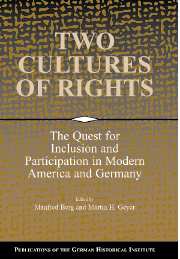Book contents
- Frontmatter
- Introduction
- Part 1 Race, Immigration, and Rights
- Part Two Civil and Social Rights
- 6 “The Right to Work Is the Right to Live!”: Fair Employment and the Quest for Social Citizenship
- 7 Social Rights and Citizenship During World War II
- 8 Just Desserts: Virtue, Agency, and Property in Mid-Twentieth-Century Germany
- 9 The Political Culture of Rights: Postwar Germany and the United States in Comparative Perspective
- 10 The Emerging Right to Information
- Part Three Gender, Sex, and Rights
- Index
8 - Just Desserts: Virtue, Agency, and Property in Mid-Twentieth-Century Germany
Published online by Cambridge University Press: 05 January 2013
- Frontmatter
- Introduction
- Part 1 Race, Immigration, and Rights
- Part Two Civil and Social Rights
- 6 “The Right to Work Is the Right to Live!”: Fair Employment and the Quest for Social Citizenship
- 7 Social Rights and Citizenship During World War II
- 8 Just Desserts: Virtue, Agency, and Property in Mid-Twentieth-Century Germany
- 9 The Political Culture of Rights: Postwar Germany and the United States in Comparative Perspective
- 10 The Emerging Right to Information
- Part Three Gender, Sex, and Rights
- Index
Summary
Entitlements, or Rechtsansprühe, have become central in both American and (West) German political discourse. Rather than focusing on the possession of private property as the basis of security (as in the nineteenth century), individuals have increasingly demanded legally guaranteed social claims as the ultimate barrier against a fall into misery. The demands reflect past failures of private property to provide satisfactory protection against the effects of inflation and depression, for example.
Developments in postwar West Germany suggest that demands for entitlements also reflect more complex attitudes about individual rights, status, and agency. Operating in a culture of rights, twentieth-century German property holders believed that they had a right to their private property and personal status because both reflected their moral worth and efficacy as individuals. To preserve the moral order, they asserted, society must act to restore that property and status whenever human villainy or amoral material forces wiped them out. Doing so would reaffirm both the honor and the autonomy of individuals. Germans raised their claim of substantive rights for an inherently superior minority against two other discourses: laissez-faire liberalism, which recognized only economic necessity and formal rights, and the politics of victimization, which offered broad but demeaning claims for social assistance.
- Type
- Chapter
- Information
- Two Cultures of RightsThe Quest for Inclusion and Participation in Modern America and Germany, pp. 167 - 188Publisher: Cambridge University PressPrint publication year: 2002

